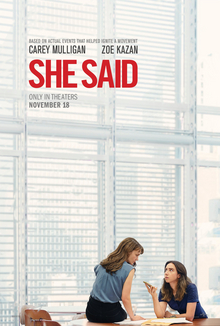“She Said” is what the media needs more of
Dec 2, 2022

One of the latest movies to hit theaters was “She Said.” It depicts the story of Jodi Kantor and Molly Twohey as they developed the New York Times article that exposed the heinous acts of Harvey Weinstein to the world and began the MeToo movement.
The movie told an impactful story revealing not just the journalistic courage of Kantor and Twohey but the courage of all the women who spoke out. Their article changed the environment for women everywhere and undeniably caused important conversations worldwide.
And yet, over five years after this story and similar ones about Donald Trump, Bill O’Reilly, Roger Ailes, and many other big names in the media industry came out, the impact these disgusting men and those similar have had on women is still seen far too often.
It is obvious the patriarchal nature of our society only enforces this misogyny and normalized violence, but despite every article, book, speech or movie produced in protest, what has really changed?
Major industry leaders like Weinstein developed a culture of normalized harassment and sexism for decades. Social media figures perpetuate this issue even more in the more internet-oriented world.
Figures with cult-like followings, such as Andrew Tate, Dave Portnoy and even King Bach, have said or done various acts that contribute to a continuous misogynist society. Whether it be being outwardly known to rape women, demeaning them based on appearance, or ‘comedic’ skits sexualizing women, they all are part of the problem, and we continue to provide them with platforms.
A distinction must be made between awareness and unnecessary attention. Addressing their offensive acts is important and should be reported, but continuing to support them by consuming their or similar influencer’s content, continuously speaking about them in interest rather than criticism or providing them a space to speak on podcasts and videos only spreads their voices; voices that are harming half the population.
It has come to a point where the incels of the world are running the internet, and far too many young people are consuming and agreeing with their oppressive content. They directly incite violence against women when they talk about them as objects rather than real people. To these influencers and their followers, women are more objects for their use than people who lead their own lives, have their own wants/needs, and can make their own choices irrespective of what men expect them to do.
As a generation, our world becomes more open and understanding when young people are exposed to less violent and oppressive content. If more inclusive and generally positive pundits were followed the same way their counterparts currently are, susceptible young adults would be better able to learn that this behavior is wrong. They shouldn’t do it, especially since it is okay to speak up if or when they are being hurt.
This article is not to say that men do not face harassment or assault. 43 percent of men are victims of some form of sexual harassment/assault in their lifetime, according to the National Sexual Violence Resource Center (NSVRC). Though it is also important to remember that the NSVRC says that 81 percent of women face the same problems – almost double the rate of men.
Movies like “She Said” highlight sexism and sexual violence in a critical way that supports victims, not encourage abusers.
As I watched the movie, I enjoyed the sense of camaraderie throughout the theater. However, this delight came with a sense of dread as primarily women and their friends or family members were watching the movie. If most women consume this impactful content, is its message reaching the desired audience beyond them?
Women already understand and relate to these horrific acts; it is less of a learning experience and more of a time to bond. For men, no matter what is said about how much they ‘understand’ women, it is not the same experience. The more men consume media that highlights the female experience, the more they will be able to sympathize with women.
Sexual harassment and assault are issues that cannot go away just by watching movies that focus on the victim, but at the very least, it takes away the platform that far too many are giving oppressive figures.
